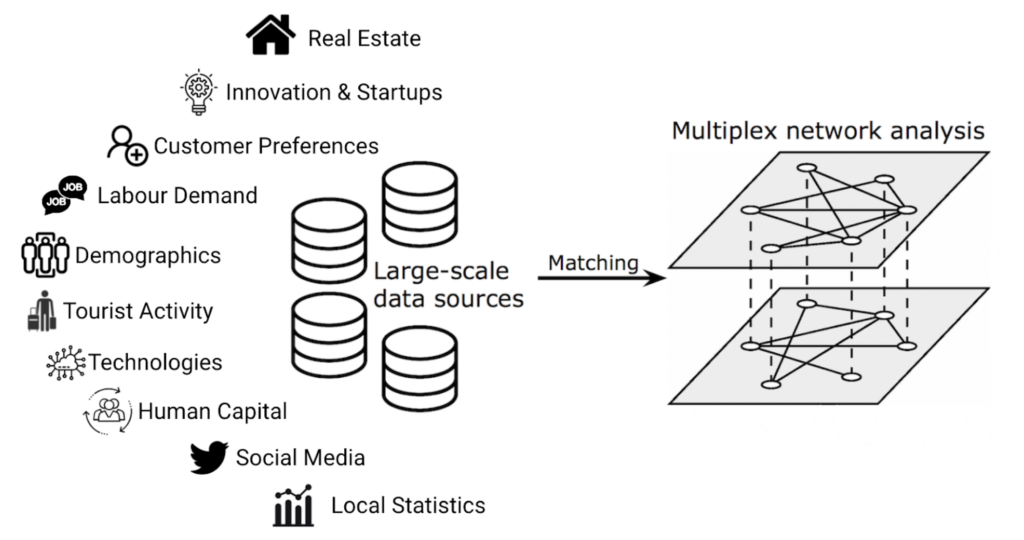Our Vision
Learn more about our vision with Fabian Braesemann and Fabian Stephany on the BE.CURIOUS podcast by the Oxford / Berlin Research Partnership
The ‘Datenwissenschaftliche Gesellschaft’ (eng: Data Science Corporation; short: DWG) aims to reveal the complex interactions that shape today’s economy. We believe that data and data science can help people and institutions to better understand and manage the complex business, social and economic problems of the globalised world. Therefore, we gather and analyse data from various sources to create a digital representation of the multiple layers of human behaviour and their interactions in urban ecosystems, which are the hotbeds of economic and social activity in the 21st century.
Our world is complex and chaotic. The modern metropolis exemplifies this complexity. It has become a place of “liquid modernity” marked by constant change. While each of these changes challenge us, they can not be regarded in isolation; they are interconnected. To understand the problems and opportunities in today’s economy, we need to connect the dots. This is what the DWG does.
What we do
The DWG collects data covering local labour markets, human capital distribution, start-up activity, real estate markets, demographics, customer preferences, and technology adoption in urban ecosystems. The individual data layers are combined to provide a unique 360° perspective on these locations, forming the foundation for analysing and modelling urban economies as complex systems. The data and derived models allow us to offer applied data science solutions to decision-makers in public and private sectors who want to use data science for better economic policies, planning and investments (Figure below).
We developed a data collection infrastructure that gathers multiple data sets about urban economies in Europe in real-time (Figure below). Analysing the multi-layer data using state-of-the-art data science methods allows us to develop innovative, sustainable, and practical data science tools to inform the decision making of social policy actors and private sector organisations in different industries. The scalable data collection infrastructure, the data and the models that describe urban economies and their interactions as complex systems form the value proposition of the DWG. Together, they allow us to harness the economics of scale and synergies of maintaining the complete data science pipeline.

The DWG’s data science projects focus on three themes. Here, we provide an example for each topic, giving an overview of our mission: translating multilayered data analysis into actionable insights:
Urban Ecosystems
For an institutional client, we collect data about local housing prices, labour market trends, demographics, touristic activity, and customer preferences to model and statistically identify the correlations and time-lags between these factors in Austria to understand changing real estate markets in times of the Covid-19 pandemic. We are extending this methodology to construct an early-detection tool that predicts gentrification and housing market shortages in individual neighbourhoods of urban areas in Europe.
Online Platforms and Digital Economy
For the United Nations Development Programme, we model and visualise the digital development status of countries in Eastern Europe and Central Asia. With the combination of data from various online sources about e-governance, the platform economy, and cybersecurity, we deliver the basis for targeted policy interventions by the UN and showcase best practice regions. This multilayered analysis of online platforms for measuring digital development will be implemented with other policy partners across different regions.
Innovation Ecosystems and Company Success
We leverage online platform data to map startup firms and investors as a network for investors in the real estate industry. The network data analysis helps the investors to find the most central startup companies and improve subsequent investment decisions. In combination with natural language processing of social media data, we are working on a model that infers the personality traits of startup entrepreneurs to derive early-stage company success predictions.

